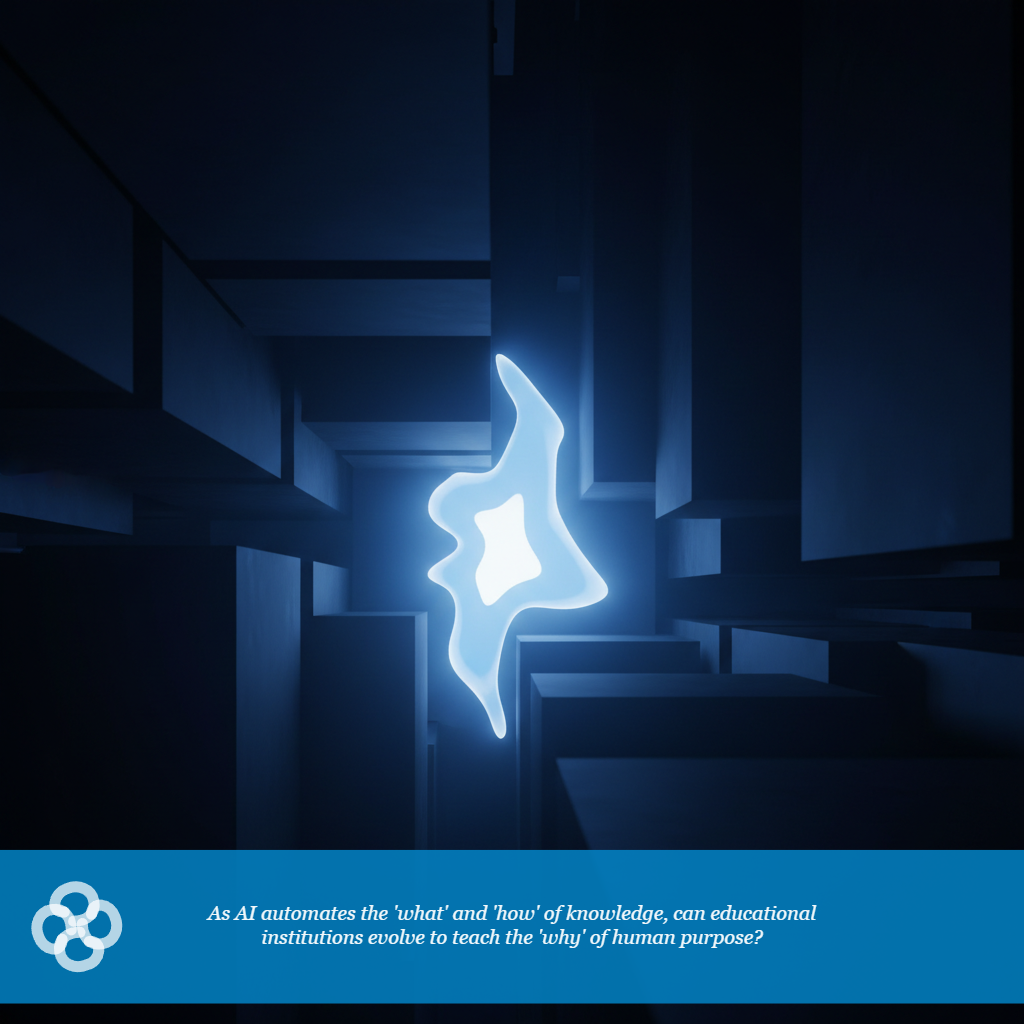AI isn’t replacing education—it’s forcing education to become authentically human for the first time. By handling all the mechanical parts of learning, AI reveals a profound paradox: the very human consciousness needed to decide what should be automated cannot itself be automated. Universities must choose between becoming efficiency machines (and losing their relevance) or becoming consciousness cultivation communities (and finding their purpose).
Imagine a master craftsperson whose apprentice suddenly gets access to power tools that can cut, shape, and polish with perfect precision. The apprentice panics, thinking they’re about to be replaced. But the master smiles and says, “Finally, now you can learn what tools can never do—how to see, how to imagine, and how to create something the world has never seen before.
This is the moment higher education finds itself in today. And most universities are still panicking instead of smiling.
The Forced Choice
AI is not gradually infiltrating higher education—it’s creating a sudden, stark choice that can no longer be avoided. Universities can either optimize for efficiency (becoming sophisticated information delivery systems) or optimize for transformation (becoming communities where consciousness develops through relationship and struggle).
There’s no middle ground because AI has made the middle ground obsolete. Any educational function that can be systematized, scaled, or standardized will be done better by AI. The only remaining question is what universities do with the space that creates.
The Authenticity Machine
Here’s what makes this transformation fascinating: AI functions as an “authenticity machine.” It forces everything artificial about current education to reveal itself as artificial, while making everything genuinely human more valuable than ever.
Consider the traditional essay assignment. For centuries, we used essay writing as a proxy for learning—assuming that the struggle to produce written work was identical to the process of developing understanding. AI has permanently severed that connection. Students can now produce sophisticated essays without doing any of the thinking we thought the essay required.
This seems like a crisis until you realize it’s actually a liberation. We’re finally free to design learning experiences around what we actually want: the development of judgment, creativity, wisdom, and consciousness. The essay wasn’t the learning—it was just a convenient (but flawed) way to measure learning.
The Platform University Revolution
The most insightful prediction about higher education’s future isn’t “unbundling” or “muddling”—it’s internal reorganization around this human-AI complementarity. Successful universities will become platforms hosting three distinct but integrated educational approaches:
The Utility Track: AI-enhanced, highly efficient credential and skill development for professional competency. Fast, cheap, scalable, and perfectly adequate for information mastery and technical capability building.
The Transformation Track: Human-intensive, relationship-based education focused on consciousness development, critical thinking, and wisdom cultivation. Slow, expensive, intimate, and irreplaceable for developing judgment and character.
The Innovation Track: Human-AI collaboration focused on research, creativity, and breakthrough thinking. Combines AI’s processing power with human imagination and intuition to push boundaries of knowledge and capability.
Students wouldn’t choose one track—they’d move between them based on their goals, creating personalized educational journeys within trusted institutional frameworks.
The Dependency Paradox
The most profound insight from systems analysis reveals AI’s ultimate limitation: it depends entirely on human consciousness for the very decisions about how it should be used. Every choice about what to automate, how to integrate AI, and what constitutes educational improvement requires irreducible human wisdom that cannot itself be algorithmatically determined.
This creates what we might call the “consciousness preservation imperative.” The more effectively we integrate AI into education, the more crucial it becomes to cultivate the human consciousness that guides that integration. Universities that lose sight of this paradox will automate themselves into irrelevance.
The Enhancement Trap
Most current AI-education discourse falls into the “enhancement trap”—assuming AI makes everything better by making it more efficient. But efficiency and educational transformation often work in opposite directions. Learning frequently requires inefficient processes: confusion, struggle, failure, reflection, and gradual understanding that cannot be optimized without being destroyed.
The systems insight reveals that AI-enhancement discourse often serves efficiency and control imperatives rather than learning imperatives. When we make “technological sophistication” synonymous with “educational quality,” we’ve already lost the plot.
The Consciousness Cultivation Opportunity
The opportunity is extraordinary: AI can handle all the mechanical aspects of information processing, freeing humans to focus entirely on consciousness development. Imagine universities where:
- Faculty spend time mentoring and engaging in Socratic dialogue rather than grading papers
- Students grapple with complex, ambiguous problems that require judgment rather than memorizing information
- Assessment focuses on growth in wisdom and character rather than information regurgitation
- Research combines AI’s processing power with human creativity and intuition
- Learning communities form around shared inquiry rather than credential acquisition
This isn’t romantic nostalgia—it’s the most technologically sophisticated approach possible. It leverages AI for what it does best while maximizing what humans do uniquely.
The Choice Point
We’re at a historical inflection point. Universities can either:
- Compete with AI by trying to be more efficient information processors (and lose)
- Be replaced by AI by failing to articulate their unique value (and disappear)
- Partner with AI by becoming platforms for uniquely human development (and thrive)
The third option requires courage to admit that much of what we called “education” was actually sophisticated busywork that machines can do better. But it also offers the possibility of educational institutions that are more human, more transformational, and more necessary than ever before.
The Wisdom Imperative
The ultimate question isn’t whether AI will change higher education—it’s whether higher education will embrace the change AI makes possible. AI forces us to be honest about what education is really for: developing human consciousness capable of wisdom, judgment, creativity, and ethical reasoning in an increasingly complex world.
Universities that organize around this mission won’t just survive the AI transformation—they’ll lead it by becoming what they were always meant to be: communities where human potential is cultivated through relationship, challenge, and the irreducible mysteries of consciousness development.
